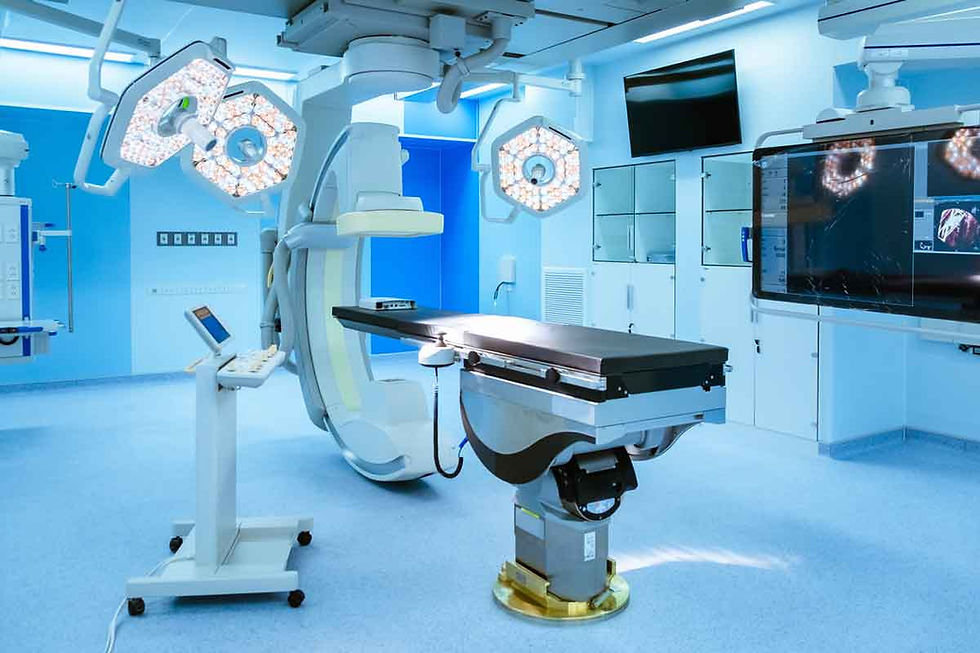Second Cardiac Electrophysiology Laboratory Open in Oxford
- RPH News Editor
- Nov 28, 2022
- 3 min read
Regent’s Park Heart Clinics Ltd. (Regent’s Park), an independent healthcare company specialising in the diagnosis and treatment of heart disease, today announced it opened a second state-of-the-art cardiac electrophysiology (“EP”) and ablation laboratory at The John Radcliffe Hospital in Oxford. The John Radcliffe is a major tertiary cardiothoracic teaching centre providing open-heart surgery and leading-edge cardiology with strong academic links with the medical sciences faculty of Oxford University.
The EP lab was officially opened by Trevor Campbell-Davis, Chief Executive of the Oxford Radcliffe Hospitals NHS Trust and Dr. Stephen Green, Consultant to the Department of Health vascular programme.
Trevor Campbell Davies, Chief Executive, Oxford Radcliffe Hospitals NHS Trust said: “We are pleased to be working with Regent’s Park and thank them for providing us with the ability to expand our capacity during the transition period between the expansion and upgrade of services that is currently underway on the John Radcliffe site.”
Dr. Ohri added: “The delivery of this bespoke lab in just 12 weeks and on budget was achieved through a close working collaborative with the Trust. To our knowledge, we are the only company in the UK or Europe to have developed these type of specialist cardiac arrhythmia laboratories. The inspiration for their development followed an invitation I received to visit the Cleveland Heart Clinic about a year ago. The Cleveland Heart Clinic is considered to be one of the best heart centres in the world, and seeing first hand the size, versatility and technology-driven nature of their cath labs, made me realise the need for us to embrace international best practice and to follow a similar course”.
Bryn Webber, Lead Nurse at Regent’s Park, commented: “Visitors to this lab are surprised by both the amount and the use of the space we have been able to provide within a modular environment. Having worked in and visited many catheter lab facilities across the UK, I really appreciate the importance of the working area and its impact on operational flow and patient saftey. In many ways I feel this modular facility outperforms a number of fixed site catheter labs for its space, layout and clinician friendly feel. For once it feels as though a catheter lab has been built to focus on the needs of catheter lab staff and the patients they serve”.
Dr. Ohri said: “Regent’s Park have taken the strategic decision to invest in the cardiac arrhythmia services marketplace across the UK and have a series of additional specialist EP catheter labs in the pipeline. However, we realise that developing improved working environments for the electrophysiology community is not enough, and that we will also need to focus our efforts on addressing the chronic shortage of appropriately trained EP cardiac physiologists and arrhythmia nurses. We intend to respond to this shortage by putting in place innovative recruitment, training and retention strategies over the coming months and years”.
Regent’s Park is an independent company dedicated to creating world-class centres for the diagnosis and treatment of heart disease. The company develops, owns and operates diagnostic and treatment facilities focusing exclusively on cardiovascular disease in partnership with leading hospitals and groups of cardiologists across the United Kingdom. The company was founded in 2002 to pioneer joint ventures with the NHS across the field of cardiac services, delivering expertise, quality and innovation in one value for money package.
Regent’s Park prides itself on its ability to deliver high quality, cost effective cardiac care, through excellent service, efficient operations management, well trained staff, and uncompromising professionalism.
Its guiding philosophy is that every patient with heart disease should have access to healthcare of a worldclass standard.
Dr. Ohri, Chief Executive, Regent’s Park Heart Clinics responded: “Regent’s Park are very proud to have worked with the Trust since 2004, and were delighted to have been asked to expand EP service provision. This second EP lab is the most modern and advanced in our fleet, and its deployment reflects both the continuing growth within the cardiac arrhythmia services marketplace as well as the excellent relationship we have developed with the Trust.
The cath lab was delivered in three sections, using a super-size 121 metre high crane weighing 500 tonnes, before being lowered into a small quadrant within the John Radcliffe Hospital beside the Cardiac Investigations Annexe.




Comments